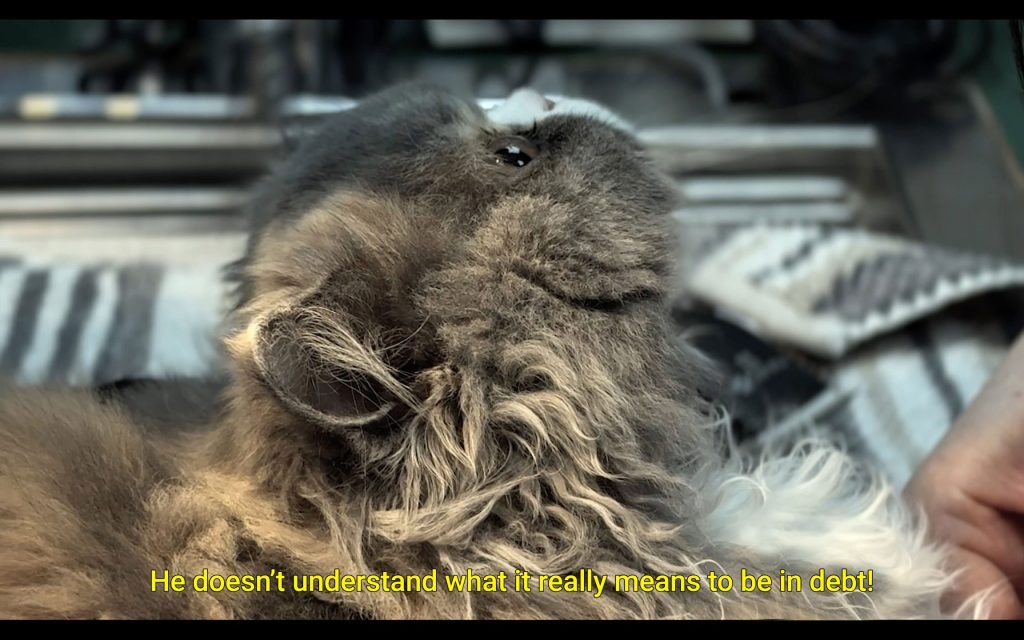
Freudian Typo, Condensed Word, Displaced Flesh, 2025. Video still, three channels, 9'.
| Dates: | 11 June – 31 August 2025 |
| Venue: | Delfina Foundation |
| Opening times: | Tues – Sun, 12:00 – 18:00
Late Openings: 18:00–20:00 |
| Access information: | Please refer to this page. |
| Questions: | info@delfinafoundation.com |
‘A debt is just the perversion of a promise … corrupted by both math and violence.’
– David Graeber, Debt: The First 5000 Years
Delfina Foundation is pleased to present Condensed Word, Displaced Flesh, a newly commissioned body of work by Iranian-Canadian artist duo Freudian Typo (Ghazaleh Avarzamani and Ali Ahadi).
The exhibition unfolds debt not as a financial anomaly but as a key element that forms the contemporary political economy of Western Christendom, imposed and made hegemonic globally. The exhibition highlights how historical systems of accumulation and coercion bind singular lives into perpetual debt, turning precarity into a universal human condition.
Departing from the English translation of Chad Gadya—an allegorical tale that operates on a chain of catastrophes and punishments after a little goat is bought for two zuzim (coins)—the exhibition invokes the illusionist tactics of capital, where all accumulation is made to appear as the disappeared. In turn, generations pay the debt they never caused. What vanishes is never capital, but the visibility of those made to repay it—and the ledger that never balances.
Visitors are invited into a ‘Debterinary’, a dreamlike multimedia installation resembling a veterinary, a tax office, a clinic, and even a gallery. It operates along the Freudian mechanisms of condensation and displacement that structure the logic of dreams: meanings are sometimes condensed into a single image, and sometimes displaced onto another that is seemingly separate yet psychically linked. At the heart of the dreamscape is a video where a cat—representing the first debtor who ate the goat in Chad Gadya—undergoes a surreal surgery only to find out that the doctors’ real intention is to search for the two missing coins. When two coins cannot be found, visitors might question who is next on the operating table?
With references to finance, medicine, and classical English literature—particularly Shakespeare’s The Merchant of Venice and The Moor of Venice (Othello) where the emblematic Jewish and Moor figures are both subjects to the same system of prosecution—visitors encounter a series of bureaucratic posters, images, and sculptures shaped by the financial (moral) grammar of Western Christendom. Within this horizon, where debt and finance gave rise to the lexicon of guilt, sin, and redemption, the exhibition ponders how a shift in the way we imagine collective autonomy and individual agency can emerge through a rupture in the language of finance and morality.
Artist biographies
Ali Ahadi (b. Iran) is an Iranian-Canadian Vancouver-based artist. His practice spans site-specific installations, sculpture, photo and video-based works, writing and translation. In Ahadi’s practice, the work is constituted through addressing art’s problems of presentation and representation, demonstration and monsteration, and the entangled relations between aesthetics and the contingencies of abstraction.
Ahadi has participated in a body of solo and group exhibitions at Griffin Art Projects, Ag Galerie, Tehran 8th Sculpture Biennial, Milan Image Art, Grunt Gallery, Morris and Helen Belkin Art Gallery, Access Gallery, and Richmond Art Gallery, to name a few. He holds a PhD in Interdisciplinary Studies from the University of British Columbia. He is currently presenting solo exhibitions at Hayward Gallery, and Delfina Foundation, in collaboration with Ghazaleh Avarzamani. Ahadi teaches in the UBC’s Department of Art History, Visual Art, and Theory, where he previously received his MFA in visual arts in 2012.
Ghazaleh Avarzamani (b. Iran) works primarily in sculpture and installation. Her practice explores inherited knowledge systems, exposing invisible social hierarchies, dysfunctionality, and failure. By reconfiguring materials and constructing visual narratives, she aims to disrupt hegemonic structures and highlight the extraordinary within the ordinary. Avarzamani’s work has been shown internationally, including the Dhaka Art Summit, MOCA Toronto, Toronto Biennial, Aga Khan Museum, and Rockefeller Foundation. She is currently presenting solo exhibitions at the Hayward Gallery and Delfina Foundation, in collaboration with Ali Ahadi. Her work is held in major public and private collections.
NOTES ON TIMINGS
Opening reception
18:30–20:30, Tuesday 10th June, Delfina Foundation
PRESS RELEASE
Download a copy of the press release here.
EXHIBITION HANDOUT AND INTERVIEW
Download a copy of the exhibition handout, which includes an interview with the artists, here.
COVERAGE
PRESS CONTACT
Josie Spalla
Communications Manager
josie@delfinafoundation.com
+44 (0)207 233 5344
Public Programme
Freudian Typo in conversation with Mohammad Salemy and Erin Li
18:30–20:00, Friday 13 June, Delfina Foundation
Join us to hear artist duo Freudian Typo (Ghazaleh Avarzamani and Ali Ahadi) in conversation with art critic Mohammad Salemy, and Delfina Foundation Curator Erin Li. Reserve your spot here.
Tours
Guided tour by artist Ghazaleh Avarzamani
18:30–19:30, Wednesday, 9 July
Guided Tour and Breakfast with Curator, Erin Li
9:00–10:00, Wednesday, 23 July
Guided Tour and Breakfast with Ghazaleh Avarzamani
10:00–11:00, Saturday, 9 August
Reserve your spot here.
CREDITS
This exhibition has been made possible thanks to the support of the Freudian Typo Exhibition Circle and Delfina Foundation’s Network of Middle East, North Africa, and South Asia Patrons.
The artists will present a concurrent exhibition titled Freudian Typo at the Hayward Gallery’s free HENI Project Space from 10 Jun – 31 Aug 2025.
